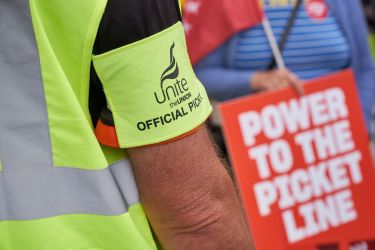The evolution of the TUC Solidarity Hub project and supporting industrial action
The project was designed to help bring together the TUC’s support for unions engaged in campaigns and disputes, and to be more visible and more practically supportive of industrial action, with our unions being key to shaping its development and continued success.
In his speech to TUC Congress last year, then-incoming TUC general secretary Paul Nowak made clear that one of his five big priorities would be a growing trade union movement with solidarity at its heart. These are the guiding principles of the solidarity hub project, which essentially can be defined by two key components, the practical support on offer to unions and then the internal tracking of our union disputes and campaigns through our dispute intelligence database.
We remain in a growing living standards crisis. The real value of wages remains below where it was in January 2008, 15 years ago, contributing to the longest real pay squeeze in living memory. Britain’s cost of living crisis is far from over. The need for organised workplace union representation is more important than ever before and where the TUC can add value and support, our work through this project will strive to do that.
One of the ways the TUC have addressed these challenges is to make union campaigns and industrial action more effective and where unions have been winning and winning well, to amplify that and demonstrate union value. Because the fact remains, unions are fighting and winning for working people. With so many of our unions engaged in national and local disputes across the UK over the course of the last 12 months, the need for a centralised platform of support for the movement is clear. The solidarity hub provides that platform.
In this blog, we have outlined how we've used the solidarity hub to support unions in dispute so far, the role of the freshly launched national dispute intelligence database and how we intend to expand the Hub in the future.
The Solidarity Hub
The solidarity hub exists to amplify the message of workers in dispute, give confidence and support unions to make a success of their campaigns and disputes, and win for workers everywhere. Using a range of online tools, our expertise and wealth of experience in campaigning, organising, and engaging, we can offer very real solidarity and support.
We’ve broken down how we can help in three very easy ways, either pre-dispute, in dispute or post-dispute. For unions seeking help pre-dispute, meaning building towards a ballot, we have helped unions with advice for organising and winning ballots. We have online guides to the ballot process and very practical tips for organising and engagement.
Our peer-to-peer texting support has proved valuable. We have worked closely now with 14 unions providing hands on practical support in using that new technology in ballots and we have seen some incredible turnouts as a result, in most cases comfortably beating those legal thresholds for action. The need for high turnouts during a dispute is beyond the legal. We have seen disputes where high ballot results, a reflection of high engagement with members, have moved the employer to an agreed settlement without having to even take a day’s industrial action. A shining example of this being the FBU and their impressive victory for 30,000 members in the Fire and Rescue service.
We are particularly proud of the support and guidance we have given to those unions balloting their members for the very first time. In those cases, we have helped walk through the legal framework, GDPR advice around contacting members, using new technologies and most importantly giving them the confidence to successfully ballot and to win.
For those currently in dispute, we have a range of support available through our website. That range of support is growing with each passing dispute. We continue to organise as many picket line solidarity visits as possible with senior TUC officials. Where possible our General Secretary Paul Nowak and Assistant General Secretary Kate Bell are keen to visit as many workers taking action as possible to bring messages of solidarity on behalf of the entire movement.
That wider picket line solidarity is of course going on every day across our regions and nations, with the TUC playing a role in bringing together unions in support and involving trades councils and community groups.
We have a range of tools available to start an online campaign through our Megaphone digital platform. For reps looking to build petitions, targeted email campaigns and now fundraising through our pilot Strike Funder project, support is available on our website. Megaphone is run by the TUC and free for affiliates to use. The platform has now amassed over 1.6 million signatures on over 430 petitions, and we are currently supporting 26 unions across these range of tools.
A popular online feature also available to reps is our range of online learning mini-modules and pocket guides. These include resources on preparing for action, effective communications, mental health guidance, acting loud and legal, a pocket book on organising and more. These have already proved very popular with 46% of all unique visitors to the site in 2023 interacting with one of these resources.
In recognising the vital role trades councils play in bringing solidarity on behalf of the local community, we have dedicated a webpage to searching for and locating your nearest local trades council. With the high traffic of reps using the website, they will be able to easily find contacts who could mobilise local support, sign petitions and help distribute local information. Community campaigning and engagement underpins much of the solidarity we see and would like to support and build on.
Our website is now set up to receive help requests directly. We have set up a very easy to use online portal which features a Get help now tab with an online request form. Once complete we go to work on servicing that request as best we can. We have supported unions with a wide range of bespoke support running alongside our practical online offering, which includes research, training and development and much more.
To showcase union wins and most importantly how unions are winning, we are extremely proud to launch our Solidarity Stories collection. These case studies seek to capture first hand testimony of unions winning for workers and the methods and tactics used to reach a successful resolution. We are using our extensive media reach to promote these stories and hope that they serve as good shareable practise to benefit and inspire the wider movement.
The most recent example is the Unite the union win at Coca Cola which captured shareable organising lessons. A notable and effective strategy that worked for them in both recruitment and organising was asking the reps to map the workplace. Reps mapped each shift because technicians had a different work pattern to clerical staff. This way they didn’t miss a single member of staff with their communications. Reps then identified the ‘organic leaders’ in those shifts and started increasing targeted communications to them, sending emails to members for example and building that engagement with their support.
Each story captures a unique journey from dispute to victory, from the voice of the reps on the front line. We have covered a wide range of unions and sectors and explored stories of winning the peace, using action to increase union membership and workplace density, using leverage to win and so much more. Using our dispute intelligence database, we are tracking disputes through to union wins and then going to work on getting those important stories told.
Dispute Intelligence Database
The TUC with the support of affiliates, over the past nine months we have been tracking and recording disputes via the TUC Solidarity Hub’s national dispute intelligence database. This database is the TUC’s first attempt to collate, track and record disputes across the movement and across the UK with the ambition to track disputes across three stages, from pre-dispute to in-dispute to post-dispute, essentially capturing activity from ballot stage all the way through to a union win.
The data capture is comprehensive, and each entry is verified by a single point of contact in each union. TUC regions have an important role to play in capturing local knowledge and intelligence and feeding that into the national database drawing from their various regional bodies and committees.
As a result of this work, we are starting to draw out some interesting data on union wins. An internal quarterly narrative to draw out trends is being produced and we are exploring the possibility of an academic partnership to really ask some big questions of the movement and lessons learnt throughout this period on organising, the challenges and winning for workers. These reports will be used to inform the wider movement.
A function of the database at present it to ensure we continue to be proactive in supporting unions at any given stage of their action and target where unions could benefit from additional support. By tracking disputes through to conclusion, we are also now building a substantial list of union wins. Using that list to contact local reps and get their story told. These stories as mentioned above, will serve as good shareable practise for the wider movement and hopefully inspire a new generation of not only trade union members, but activists, reps and leaders.
We also use the database to provide the movement with a weekly guide to industrial action for the week ahead.
Looking ahead
We’re keen to make sure the project remains as relevant and helpful to users as possible and we’re working with unions to ensure its legacy isn’t solely tied to industrial action. Much, of course, is won without escalation to industrial action so we’ll continue to track all activity, including at campaign level. Some of the most important union campaigns are recognition campaigns and we will be working towards recording all new recognition agreements, particularly those that have been achieved by some form of campaign. This is a long-term project and a fundamental part of what the TUC wants to do with and for unions.
At TUC Congress 2023, we will be hosting a fringe event bringing together an experienced panel of speakers whose unions have used the project to build successful campaigns and outline how they think the Solidarity Hub could develop in the future.
We will be joined by Paul Nowak, TUC General Secretary, Patrick Roache, NASUWT General Secretary, Sarah Wooley, BFAWU General Secretary, Naomi Pohl, Musicians Union General Secretary and Charlie Gray, GMB and others. The session will give us the opportunity to learn from each other, reflect on 12 months of industrial action, share experiences and suggest ways the TUC can add even greater support in ensuring the wider movement is ‘ballot ready’ for the future.
The fringe event starts at 5.45pm on Tuesday 12 September and all delegates are free to attend.
Following Congress, in late-October 2023, we will be hosting a roundtable event with national union officers to discuss balloting and industrial action over the last 12 months including strike ballots and other issues. Using information from the Solidarity Hub database we will discuss lessons learnt and best practise and will feature case studies from unions.
It is important to note that this project is a work in progress and very much a shared endeavour with our affiliates. We will be using these upcoming events alongside our regular engagement with unions to continue to develop the project and ensure that the TUC is leaving no stone unturned in our support for unions and the working people they represent.
In solidarity.
Stay Updated
Want to hear about our latest news and blogs?
Sign up now to get it straight to your inbox




